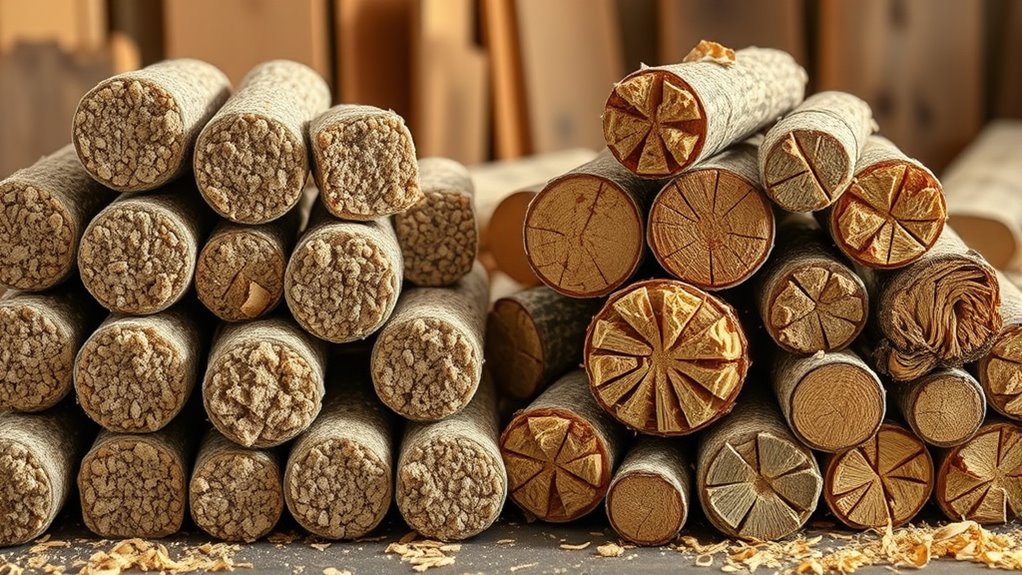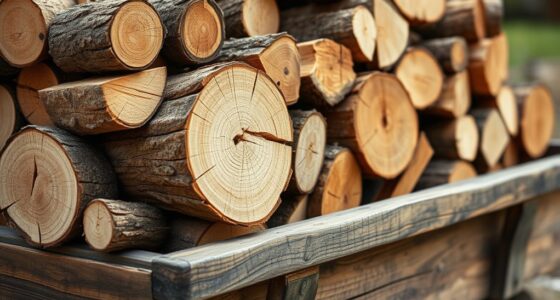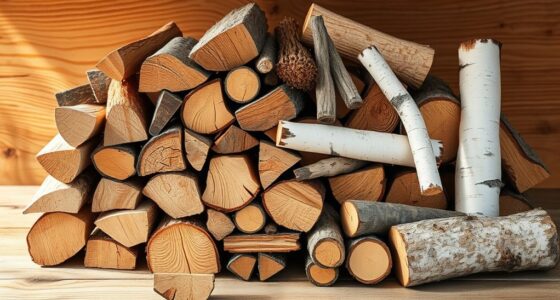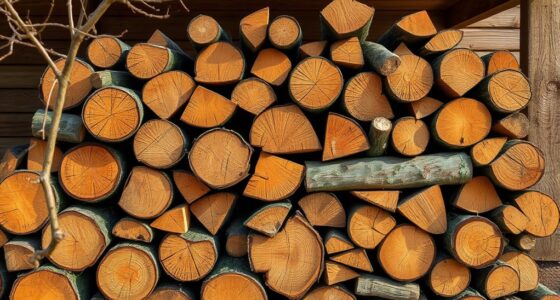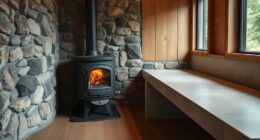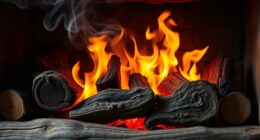Switching to alternative biomass fuels like briquettes and sawdust logs can help you reduce reliance on fossil fuels while being environmentally friendly. These fuels are made from waste materials such as agricultural residues and wood shavings, supporting sustainable harvesting and community efforts. They burn more efficiently, produce fewer emissions, and are easy to store and handle. By choosing these options, you can enjoy cleaner energy and contribute to conservation, and there’s more to discover about their benefits ahead.
Key Takeaways
- Briquettes and sawdust logs utilize waste materials, reducing reliance on traditional wood and promoting waste reuse.
- They burn more efficiently and cleanly, producing fewer emissions and less ash compared to raw biomass.
- Production supports sustainable harvesting, preventing forest overexploitation and encouraging community involvement.
- These fuels offer longer, more even burns, making them practical and cost-effective for daily heating and cooking.
- Using biomass briquettes and sawdust logs helps lower greenhouse gases, benefiting environmental health and climate change mitigation.
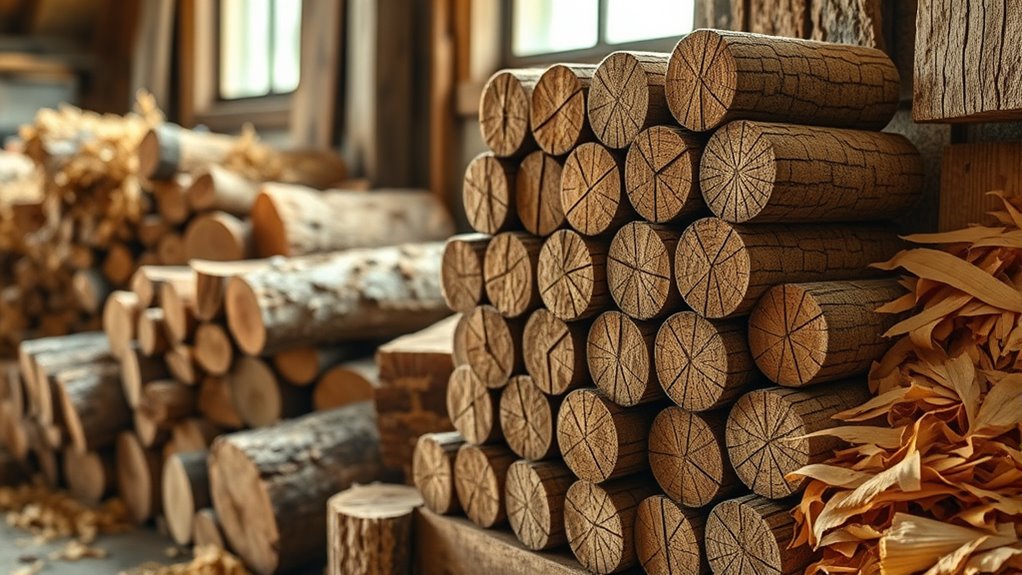
Have you ever wondered how biomass fuels can help reduce reliance on fossil fuels? When you choose alternative biomass options like briquettes and sawdust logs, you’re making a conscious decision to embrace sustainable energy sources. These fuels are made from waste materials, such as agricultural residues, wood shavings, and sawdust, which might otherwise be discarded or burned inefficiently. By utilizing these resources, you’re supporting sustainable harvesting practices that prevent overharvesting of forests and natural resources, ensuring that ecosystems remain balanced and healthy. This approach not only conserves biodiversity but also promotes responsible use of raw materials, making biomass a truly renewable energy source.
Switching to briquettes and sawdust logs also markedly contributes to emission reduction. Traditional fossil fuels release high levels of greenhouse gases and pollutants, which contribute to climate change and air quality problems. Biomass fuels, on the other hand, tend to produce lower emissions when burned properly. Briquettes are compressed blocks of biomass that burn more efficiently and cleanly than loose biomass or raw wood. Similarly, sawdust logs are designed to produce consistent, high heat with minimal smoke and ash. When you opt for these fuels, you’re helping to cut back on harmful emissions, making your heating or cooking practices more environmentally friendly. This not only benefits the planet but also improves air quality in your community.
The production of briquettes and sawdust logs promotes sustainable harvesting because it encourages the collection and reuse of waste materials rather than cutting down trees unnecessarily. This process often involves local communities and small-scale producers, creating economic opportunities while reducing pressure on forests. As a result, you get a reliable, eco-friendly fuel source that aligns with sustainable development goals. Additionally, these biomass fuels burn longer and more evenly, providing you with a more efficient and cost-effective energy option. They can be stored easily and transported without the concerns associated with bulky raw wood or loose biomass, making them practical for everyday use. Incorporating knowledge about zodiac sign compatibility can also foster community connections and shared goals in adopting sustainable practices.
Frequently Asked Questions
Are Briquettes Suitable for Outdoor Use?
Yes, briquettes are suitable for outdoor use if they have good outdoor durability and weather resistance. You should look for briquettes made specifically for outdoor fires, as they resist moisture and weather changes better than indoor types. Proper storage also helps maintain their quality. When used outdoors, these briquettes will burn consistently and efficiently, making them a reliable choice for camping, bonfires, or outdoor heating.
How Do Sawdust Logs Compare in Burning Efficiency?
While sawdust logs often provide a commendable level of combustion efficiency, their heat output can vary based on how they’re made and used. Compared to other options, they tend to burn more steadily and produce consistent warmth, making them a reliable choice for heating. Their efficient combustion means you get more heat from less fuel, ultimately offering a cozy, eco-friendly way to enjoy your fireside experience.
Can Biomass Briquettes Be Made at Home?
Yes, you can make biomass briquettes at home as a DIY fuel. To do this, gather dry sawdust, wood shavings, or agricultural waste, then mix with a binder like clay or starch. Compress the mixture using a homemade press or mold, then let the briquettes dry thoroughly in the sun. Homemade production of biomass briquettes is an affordable, eco-friendly way to create efficient, renewable fuel for heating or cooking.
What Is the Environmental Impact of Biomass Fuels?
You might think biomass fuels have a big environmental impact, but they can actually reduce your carbon footprint when used sustainably. They’re considered renewable energy sources because they come from organic materials that naturally replenish. By choosing biomass over fossil fuels, you help lower greenhouse gases and pollution. Just make certain you’re sourcing and using them responsibly, as improper use or deforestation can negate their environmental benefits.
Are There Any Safety Concerns With Using Sawdust Logs?
You should be aware of fire hazards and storage safety when using sawdust logs. These logs can be more combustible than traditional firewood, so you need to handle them carefully. Store them in a dry, well-ventilated place away from heat sources, and always follow safety guidelines. Proper storage reduces the risk of accidental fires, ensuring safe and efficient use of your biomass fuel.
Conclusion
Switching to alternative biomass fuels like briquettes and sawdust logs can considerably reduce reliance on traditional firewood and fossil fuels. Did you know that briquettes can produce up to 50% more heat than regular wood? By choosing these eco-friendly options, you not only save money but also cut down on harmful emissions. Embrace these sustainable fuels today and make a positive impact on the environment while enjoying efficient, cleaner burns.

